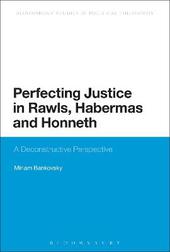
|
Perfecting Justice in Rawls, Habermas and Honneth: A Deconstructive Perspective
Paperback / softback
Main Details
Description
In this exciting new work, Miriam Bankovsky shows how the pursuit of justice requires two orientations. The first is a practical commitment to the possibility of justice, which is the clear starting point for the broadly constructive theories of Rawls, Habermas and Honneth. Indeed, if justice were not possible, it would be difficult to see why it is worthwhile for human beings to live on this earth. However, a second orientation qualifies the first. It can be expressed as a deconstructive attentiveness to the impossibility of determining justice's content. This impossibility results from the tension between the appeal for individual consideration and the appeal for impartiality, demands that Derrida believes our historical concept of justice includes. Framed by these two orientations, this ambitious book explores the promise and shortcomings of the constructive theories. Attentive to concrete experiences of injustice that these thinkers tend to overlook, Bankovsky provocatively challenges Rawls' account of civil disobedience, Habermas' defence of rational consensus, and Honneth's ideal of mutual recognition, providing new insights into deconstruction's relevance for contemporary theories of justice.
Author Biography
Miriam Bankovsky lectures in politics at La Trobe University, Australia. She is the co-editor, with Alice Le Goff, of Recognition theory and contemporary French moral and political philosophy: Reopening the dialogue (2012).
ReviewsIn this clearly written and carefully argued book, Miriam Bankovsky brings Jacques Derrida's deconstruction to bear on Rawls, Habermas and Honneth to develop a deconstructive perspective on justice that does not simply deny the possibility of justice. The book will be hard to ignore for anyone interested in the relationship between these thinkers. -- Lasse Thomassen, Queen Mary University of London, UK Miriam Bankovsky's exemplary book offers a thoughtful reflection on theorizing justice, which demonstrates the benefits of bringing different traditions of thought into dialogue with one another. Lucidly written and compellingly argued, it offers both a distinctive account of theorizing justice as a civic activity and provides the basis for a productive rapprochement between contrasting approaches to this activity. -- David Owen, University of Southampton, UK
|